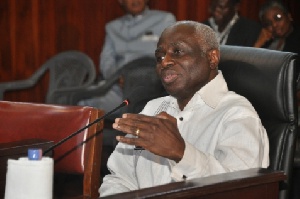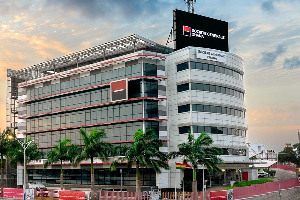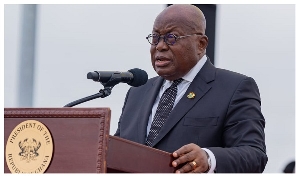- Home - News
- TWI News | TV
- Polls
- Year In Review
- News Archive
- Crime & Punishment
- Politics
- Regional
- Editorial
- Health
- Ghanaians Abroad
- Tabloid
- Africa
- Religion
- Election 2020
- Coronavirus
- News Videos | TV
- Photo Archives
- News Headlines
- Press Release
General News of Thursday, 5 December 2013
Source: The Herald
Drill Ship Saga: Tsatsu Tsikata’s UK court dossier out
The Herald’s investigations have landed the 1999 Statement of Defence filed by the Ghana National Petroleum Corporation (GNPC), rebuffing the claims of Societe Generale in the UK High Court -Commercial Division. The content of the bank document collapses claims by Kweku Baako, Managing Editor of the New Crusading Guide that Tsatsu Tsikata confirmed GNPC’s indebtedness to the French Bank.
The six-page document signed by Tsatsu Tsikata, the then Chief Executive Officer (CEO) of GNPC and filed on behalf of the Corporation by Bindman and Partners, a UK law firm, detailing the extent of the expert advice given by Societe Generale on the trading of commodity, how negligent the bank was to GNPC and other issues related to the transaction.
Interestingly, the Kufuor government snubbed this document, including a legal brief given to the then Attorney General and Justice Minister, Nana Akufo-Addo, and rather sold the GNPC’s drillship, Discoverer 511, to a Norwegian company, Frontier Drilling, for over US$24 million to defray a US$19.5 million debt in an out of court settlement with Societe Generale.
Mr. Tsikata’s strong rejection of Societe Generale’s US$47 million demand was later supported by forensic investigations done by Pricewaterhouse Coopers (PWC), two years after the Kufuor government, through the instrumentality of the Energy Minister, Albert Kan-Dapaah and his Deputy K.T. Hammond, who sold the drillship under a certificate of emergency.
The PWC’s probe procured by the Kufuor government is dated July 31, 2003, and got inputs from the then Serious Fraud Office (SFO) boss, Theophilus Cudjoe, Daniel Ntiamoah of National Security Council, Kwame Owusu and James Quarshie from the Ministries of Energy and Finance, respectively.
Others include; Richard Quartey of the Auditor General’s Office and Inspector Ashitey Annang of Criminal Investigations Department (CID) of the Ghana Police Service.
The ex-GNPC boss at the Judgment Debt Commission last week, revealed how Societe Generale desperately wanted money from the Rawlings regime by even going behind GNPC to the Finance Ministry and the Office of the Vice-President, meeting Kwame Peprah and the Vice-President, John Evans Atta-Mills, but were driven back to the GNPC, which was fighting it in the UK court.
Mr. Tsikata also disclosed how GNPC sought expert advice from a specialist on Commodity Trading, who discovered from the claims of the French bank that GNPC had been misled by Societe Generale. Following this, the bank was ready to renegotiate and indeed, moved its claims from US$47 million to US$20 million and then to US$12 million.
The negation was ongoing when there was a change of government, with the Kufuor administration rather doling out a whopping US$19.5 million.
According to Mr. Tsikata, the relationship between the Societe Generale and GNPC dates back to the autumn of 1996, when GNPC sought the French bank’s advice in relation to the protection of projected revenues from future oil and gas production, anticipated to come on stream in January 1998.
The Societe Generale agreed to provide and did provide GNPC with such advice, knowing that the Corporation would act and did in due course, and relied upon that advice, thereby earning Societe Generale profits on transactions it recommended.
Mr. Tsikata revealed that Societe Generale carried out the transactions and even assumed responsibility for the management of GNPC’s risk.
“The advice given by the Plaintiff, essentially consisted of recommending a strategy containing two elements: options were acquired which hedged the price at which the Defendant would be able to sell its future production. This reduced the Defendant’s exposure to volatility in the market in the future” and “the financing of the premiums required to pay for such options by the selling of short term options”.
However, elements of the strategy was negligently advised, exposing GNPC to huge risks in the event of market movements in the short term which could, and indeed, resulted in massive losses to GNPC despite owing the Corporation contractual duties and duties of care.
Societe Generale was to provide expert advice commensurate with the expertise in the particular market, but not to advise GNPC to enter into transactions which merely replaced risk in the long term with risk in the short term, adding GNPC’s “stated aim was to reduce its exposure to market volatility”.
Societe Generale was also not to advise the Corporation to enter into transactions to which the French bank was counterparty and in relation to which, it had a financial interest which conflicted with that of GNPC.
In breach of those duties, from 1996 onwards, Societe Generale advised GNPC to enter into several hundreds of transactions on the oil options and future markets in implementation of the strategy recommended by the Bank, despite being aware that GNPC did not have the technical expertise to assess the merits of the strategy and of each of the recommended transactions.
Mr. Tsikata’s document insisted that Societe Generale knew that GNPC did not have the technical expertise to assess the degree of risk involved in the strategy or in relation to each of the recommended transactions.
It disclosed that by a fax dated October 23, 1996, the French bank advised GNPC to implement element of the strategy in order to finance certain elements described as the advantages of this strategy, without stating that in fact, these were only potential advantages and without mentioning any of the potential disadvantages, as well as risk involved in such a strategy.
On the following day, Societe Generale again advised by fax, details of the specific trades which were recommended in the implementation of the strategy again without indicating at all, whether there were and if so, what risks were involved in undertaking those transactions.
Even in May 1997, 8 months after GNPC had started acting on Societe Generale’s advice and by which time a large number of transactions had been entered into, and the bank was fully aware that GNPC was still unable to assess independently the merits of the strategy and of any particular transaction.
Societe Generale, rather sent a fax dated May 22, 1997 to GNPC “attempting to explain how a portfolio of put and call options worked”.
The Bank continued to advise GNPC to enter into further transactions from the middle of 1997 until July 1998, despite the fact that the market continued to move against GNPC, causing ever increasing losses on the Corporation’s account with the Societe Generale, and “in July 1998, Societe Generale forced GNPC to liquidate all its positions”.
Mr Tsikata said the losses suffered by the GNPC were caused by the French Bank’s breaches of contract and duty, therefore, not entitled to any claim against the Corporation; hence the relief it is seeking should be thrown away by the court.
In the counterclaim filed by the GNPC, the Corporation said, Societe Generale is rather liable to pay for damages in the interest, pursuant to s.35A of the Supreme Court Act 1981.











